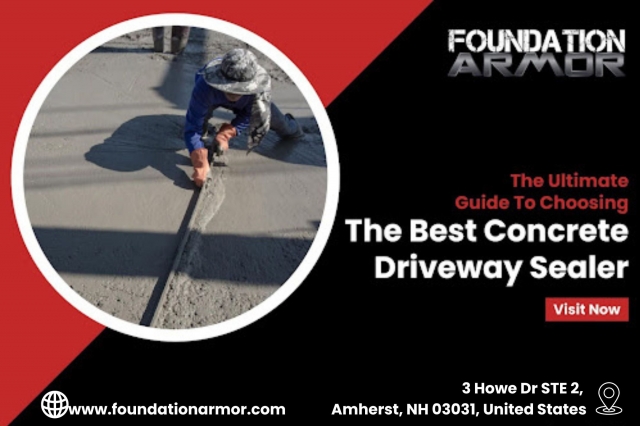A concrete driveway is an investment in your property, offering durability and a clean, polished look that can last for decades. However, to maximize the longevity and aesthetic appeal of your concrete driveway, applying a concrete driveway sealer is essential. In this guide, we'll explore the importance of concrete sealers, the different types available, and tips on how to choose the best one for your needs.
Why Use a Concrete Driveway Sealer?
Concrete is a porous material, meaning it can absorb water, oils, and other substances. Over time, this can lead to cracking, spalling, and staining, all of which detract from the appearance and structural integrity of your driveway. A concrete driveway sealer acts as a protective barrier, preventing these elements from penetrating the surface.
Key Benefits of Concrete Sealers:
- Protection Against Moisture: Sealers prevent water from seeping into the concrete, reducing the risk of freeze-thaw damage in colder climates.
- Stain Resistance: Oils, chemicals, and other spills are less likely to stain a sealed surface.
- Enhanced Durability: A sealed driveway is more resistant to wear and tear, extending its lifespan.
- Improved Appearance: Sealers can enhance the color and texture of the concrete, giving it a polished, professional look.
Types of Concrete Sealers
When selecting a Stamped concrete driveway sealer, it's important to understand the different types available. The main categories include penetrating sealers, acrylic sealers, epoxy sealers, and polyurethane sealers.
-
Penetrating Sealers
These sealers penetrate deep into the concrete, forming a chemical barrier that protects against moisture and contaminants. They are ideal for exterior surfaces as they provide long-lasting protection without altering the appearance of the concrete.
-
Acrylic Sealers
Acrylic sealers are popular for their affordability and ease of application. They form a thin, protective film on the surface of the concrete and are available in both solvent-based and water-based formulas. They enhance the appearance of the driveway by providing a glossy finish but may need to be reapplied more frequently than other types of sealers.
-
Epoxy Sealers
Epoxy sealers provide a hard, durable surface that is resistant to chemicals and abrasions. They are commonly used in commercial settings but can also be suitable for residential driveways. Epoxy sealers create a glossy, attractive finish but may yellow over time if exposed to UV rays.
-
Polyurethane Sealers
Polyurethane sealers offer excellent protection against abrasion and chemical spills. They provide a high-gloss finish and are more flexible than epoxy sealers, making them resistant to cracking. However, they are typically more expensive and can be challenging to apply.
Choosing the Best Concrete Driveway Sealer
To choose the best concrete driveway sealer for your needs, consider the following factors:
- Climate:If you live in an area with harsh winters, a penetrating sealer that offers protection against freeze-thaw cycles is essential. For warmer climates, an acrylic sealer may be more suitable.
- Traffic:Consider the amount of traffic your driveway receives. High-traffic areas benefit from the durability of a Silane-Siloxane, epoxy or polyurethane sealers, while lower-traffic areas may do well with an acrylic sealer.
- Appearance:Think about the finish you desire. If you want a natural look, opt for a penetrating sealer. For a glossy, decorative finish, acrylic, epoxy, or polyurethane sealers are better choices.
- Maintenance:Determine how often you are willing to reseal your driveway. Penetrating sealers generally require less frequent reapplication compared to acrylic sealers.
Application Tips for Concrete Sealers
Proper application of a concrete sealer is crucial for the effectiveness of a concrete driveway sealer. Here are some tips to ensure a successful sealing project:
- Clean the Surface: Ensure the driveway is clean and free of debris, oil stains, and other contaminants. Use a pressure washer for thorough cleaning.
- Repair Cracks: Fill any cracks or holes with a suitable concrete patching compound and allow it to cure.
- Choose the Right Day: Apply the sealer on a day with favorable weather conditions – ideally, when the temperature is between 50°F and 90°F and there is no rain in the forecast.
- Follow Manufacturer's Instructions: Different sealers have specific application instructions. Follow these carefully, including the recommended number of coats and drying times.
- Use Proper Tools: Use a roller or sprayer to apply the sealer evenly. For best results, avoid applying too thickly as it can lead to sealer pooling, bubbling and uneven drying.
High-Quality Concrete Driveway Sealer is Essential
A high-quality concrete driveway sealer is essential for maintaining the beauty and durability of your driveway as well as to protect your investment in your driveway. By understanding the different types of concrete sealers from Foundation Armor and considering your specific needs, you can choose the best product to protect your investment. Regular sealing, combined with proper maintenance, will keep your concrete driveway looking great and performing well for years to come.
Investing time and effort into sealing your driveway not only enhances its appearance but also provides long-term protection against the elements, ensuring that your driveway remains a valuable asset to your property.






